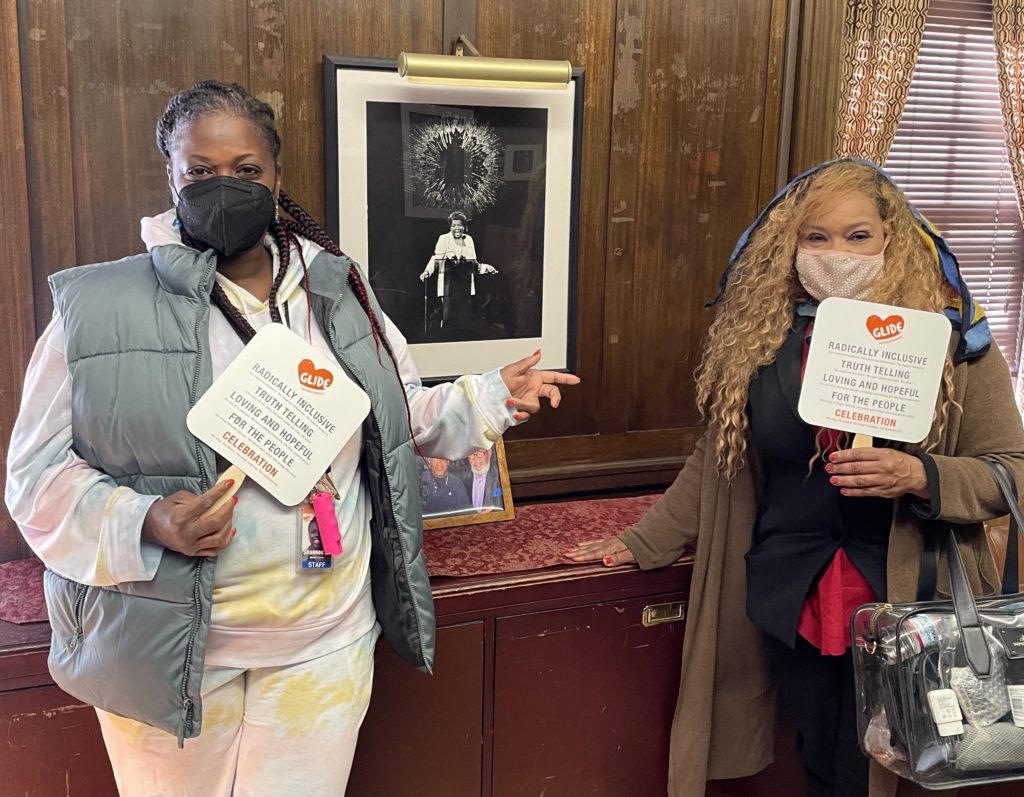After losing her job due to cutbacks, and then being evicted from her apartment, Nikki found herself living on the streets of San Francisco. People experience homelessness for various reasons and the impact of being unhoused can be extremely detrimental to an individual or family. It exacerbates existing health problems, increases risks for new ones, including communicable diseases and the potential for encountering physical, mental and emotional harm. For women, there is often an added layer of abuse. For Nikki, the Women’s Center at GLIDE was pivotal in finding shelter in single residence occupancy housing, and giving her the unwavering love and emotional support that she needed to thrive. In this special Women’s History Month feature, tune in as Nikki shares her story and engages in a conversation with Shannon Wise, GLIDE’s Women’s Center Manager, about the unique challenges many unhoused women face.

Read more on Nikki with this Q&A session:
Q: Can you tell us a little bit about yourself and how you found out about GLIDE?
A: At one point, I was housed in San Francisco. I actually worked for the city. However, they did have cutbacks and I ended up getting an eviction notice after only one month of late rent. The landlord wanted to start the eviction process right away. Back then, I didn’t want my credit messed up. My credit was decent. I tried to make payment arrangements, but unfortunately there’s not enough rental reform, and they wanted me out after only one month of late rent.
I did end up homeless and, long story short, I actually was street homeless. I slept in front of the public library for two weeks – it’s the library across from City Hall. That was just the best place for me as a woman to feel safe, because the lights are on 24 hours and there’s security there all night. They can check on you from inside the library. So I slept in front of the library two weeks and that was actually my first experience of being street homeless.
GLIDE is so well-known in the community for feeding people and providing resources I would come up here for my free meals. Just coming here to eat one day, I saw the Women’s Center’s table. I just decided, “Okay, let me just pop in.” And the ladies were such good listeners. They were very welcoming. They were serving coffee, tea, and some nice bakery products. They had pamphlets and information. The greatest asset I found was that they were willing to listen. They were very unconditional. I had all this luggage every time they saw me, so it was obvious I was homeless. I had a suitcase, pulling it.
GLIDE has a very established reputation in the community. I remember coming here when Maya Angelou was here. I remember coming here for church. So, this place is a staple of the community.
Q: What’s something you wish people understood about women experiencing homelessness?
A: It’s a very unique experience. I believe that a homeless woman has more of a unique experience with her safety. There’s a lot of violence. God is good. I didn’t have any kind of rape, but I had aggression, cursed out, trying to intimidate me so you could have my place in line for my bed, grabbing things that are supposed to be for me, my own resources, but you want to take them. And I’ve heard other women say that that’s happened to them on the streets. People taking their money, men stealing their money and their resources and different things like that. So I really think that women’s unique issues as homeless women have to be addressed.
And speaking to the safety, when I had my interview at my SRO, they actually really pushed that whole safe space. They are huge about that. They have a certain amount of clients that have been referred through domestic violence. They really pushed that you are not allowed to have male guests. They want to really control the environment. It’s peaceful. If it starts getting loud or anything, they take care of it right away. Because it’s like, you can sense that women are going through their healing.
Q: What solutions do you think we need to address discrimination and bias towards women?
A: As a homeless woman, the thing that I found most distressing is that they mix women and men all together. Women have no separate services, no privacy. Living at an SRO, the reason it is easier for me to heal, go through my process, do what I need to do, is because it is a safe space. Everyone goes to their room. They’re quiet. It’s orderly. Because those are the boundaries and protocols. When you mix men and women, all of our services together, it’s completely different. Because, as a homeless woman, it was a lot of competition with the men for resources and even space in line for the shelter, which you could be in line, but sometimes they wanted to fight you for your place. A woman should never have to go through that. There needs to be a separate space. We need a healing place. Places to heal.
Q:What are some goals you have in place now that you’re in a transition state?
A: I want to get more involved with the community to help, because I’ve been through it. This is my mentality, my consciousness, people still deserve humanity. They still deserve to be able to be clean. They still deserve to be able to be fed and clothed. So I feel like it’s a great asset, the knowledge. I’ve used the resources, so I can actually speak to the resources. I can speak to what GLIDE’s food program can do. I can speak to GLIDE’s Women’s Center.
